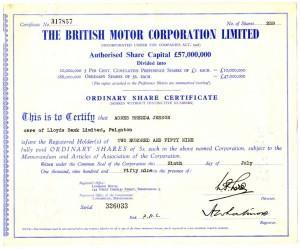Shareholders don’t really “own” firms, so why do they call the shots?
We all like to read stuff in the papers we agree with, but it’s particularly satisfying to discover an idea that gives intellectual ballast to something you believe instinctively. For me, this was the case with Prem Sikka’s piece on corporate power and funding in yesterday’s Guardian.
 A share certificate issued by the British Motor Coporation (forerunner of British Leyland and Rover) in 1959. Should possessing one of these give you dominance over other providers of capital, effort and knowledge?
A share certificate issued by the British Motor Coporation (forerunner of British Leyland and Rover) in 1959. Should possessing one of these give you dominance over other providers of capital, effort and knowledge?
Prem is professor of accounting at Essex University (stay with me). His point is simple but revolutionary: the idea that shareholders “own” firms is wrong. In fact, shareholders provide only a small fraction of total capital for most large firms – around 5% to 7% for major banks, and less than 50% for almost all FTSE 100 firms. Most capital – including what accountants call “intangible assets”, like knowledge and brand loyalty – comes from other stakeholders, including workers, suppliers, customers and society at large.
Given this, “there is no logical or financial reason to prioritise the interests of shareholders over other stakeholders in large companies,” says Prem. “In an era of universal suffrage, enabling only those with financial interests to elect directors is unsound.”
(This prompted me to dig out the accounts from my own small business. We are by no means a heavily indebted firm but, sure enough, the capital from other people – creditors, the bank and the goodwill of our clients – would probably add up to rather more than I and my business partner have put in.)
Last summer, I wrote a piece asking why, when we have so many models in the public and “third” sectors, we still only have one clapped-out model in the private sector: the shareholder-controlled, profit-maximising corporation. Shareholders are the one stakeholder in a firm whose sole interest is maximising profits in the short-term. And yet we let them run the whole shooting match. I didn’t pick up on Prem’s argument about shareholders not really owning firms and having no moral right to control them, but he’s the professor of accounting, not me.
His solution is “to get rid of shareholder supremacy from company law”. Yes, we need to promote alternatives to the conventional corporate model – mutuals, co-operatives, not-for-profit organisations and the like – but we also need to rethink what a “company” is, and what it’s for.
We might also be able to get rid of the awkward distinction between the “private sector” and the “third” or “not-for-profit” sector. Many small private firms already operate informally on a kind of “third” sector model, with goals other than just maximising profits (I know mine does). This is because of the choices their owners make about what they want to achieve, how they want to live their lives, or simply because they want to treat their workers with respect. No doubt these small businesses are what the serious “entrepreneurs” on Dragon’s Den dismiss as “lifestyle businesses”.
But large firms are locked into this one corporate model which forces them, sooner or later, to behave in the same way – running cartels, rigging prices, avoiding tax and ripping off their workers and customers. It’s only through these “institutional abuses” that companies can meet the inflated profit expectations of the stock market and the equally-inflated salary expectations of their directors, argues Prem.
Like me, Prem believes “the primary purpose of a corporation is to serve society” in whatever way works best. Supporters of the status quo will argue that shareholders’ ruthless pursuit of profit does this by bringing prosperity and creating jobs. But workers and other stakeholders want those things too. Why do we think here-today-gone-tomorrow shareholders, who often have little involvement in the company they’re supposed to “own”, know better than all the people who work in it, depend on it and, just perhaps, actually care what happens to it?
